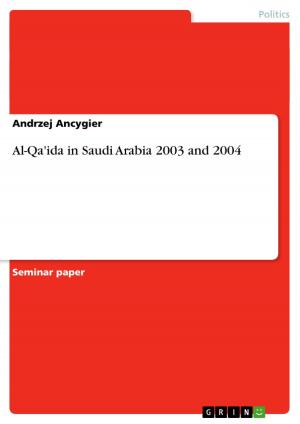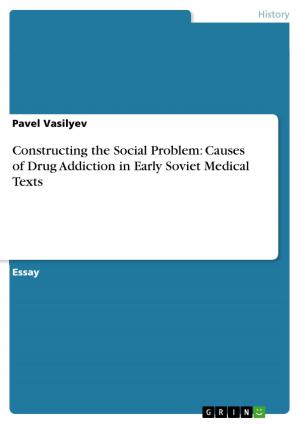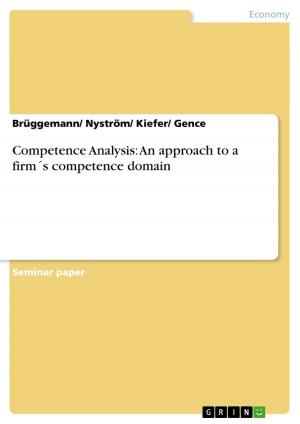Solving the EU's democratic deficit through direct democratic veto rights? A critical assessment of Heidrun Abromeit's concept
Nonfiction, Social & Cultural Studies, Political Science| Author: | Lutz Weischer | ISBN: | 9783638740203 |
| Publisher: | GRIN Publishing | Publication: | June 17, 2007 |
| Imprint: | GRIN Publishing | Language: | English |
| Author: | Lutz Weischer |
| ISBN: | 9783638740203 |
| Publisher: | GRIN Publishing |
| Publication: | June 17, 2007 |
| Imprint: | GRIN Publishing |
| Language: | English |
Seminar paper from the year 2005 in the subject Politics - International Politics - Topic: European Union, grade: 2,0, Free University of Berlin (Otto-Suhr-Institut für Politikwissenschaft), course: Proseminar 'Constitutionalism, Federalism and Democracy in the European Union', 11 entries in the bibliography, language: English, abstract: At a time of enlargement and public discussion about the European Union's proposed constitutional treaty, there is a growing concern about the democratic legitimacy of the union's institutions and decisions. In fact, most scholars agree that there is a democratic deficit in the European Union Some possible solutions are widely debated, especially a strengthening of the European Parliament.Heidrun Abromeit, a German political scientist, has proposed a solution that is different. Based on specific theoretical assumptions about democracy and the democratic deficit, she has developed the model of 'regional and sectoral direct-democratic veto rights' In this paper, I will present and asses this model. This critical assessment will have to be twofold: In a first step, the assessment has to consider the model itself: Are the model and the assumptions it is based on theoretically convincing or are there inherent contradictions? The second step, then, will be to check whether the model is the right solution for the present situation, i.e. the actual democratic deficit of the European Union. Would it overcome the democratic deficit? The answers in this second step have to be based on a coherent concept which defines democracy, explains what democracy on the European level should look like and what are the reasons for the present deficit. As I mentioned before, there a numerous concepts on this matter which are partly contradictory. Obviously, I cannot develop my own coherent concept of European democracy in this short paper. I will therefore base my judgement on the concept developed by Fritz W. Scharpf. I have chosen Scharpf's ideas as a point of reference because - thanks to the notions of input and output legitimacy - he has developed a concept that is differentiated enough to deal with the complex issues of the European integration process. Methodologically, an important part of this paper will therefore be based on a comparison between Abromeit and Scharpf. This implies that the paper will not come to a definitive conclusion on the appropriateness of Abromeit's ideas but will only show how Abromeit's ideas can be judged if one accepts Scharpf's perspective. My hypothesis is that, from this perspective, Abromeit does not present an appropriate solution to the democratic deficit because a)her model focuses too much on input legitimacy and b)her model favours negative integration and renders positive integration increasingly difficult.
Seminar paper from the year 2005 in the subject Politics - International Politics - Topic: European Union, grade: 2,0, Free University of Berlin (Otto-Suhr-Institut für Politikwissenschaft), course: Proseminar 'Constitutionalism, Federalism and Democracy in the European Union', 11 entries in the bibliography, language: English, abstract: At a time of enlargement and public discussion about the European Union's proposed constitutional treaty, there is a growing concern about the democratic legitimacy of the union's institutions and decisions. In fact, most scholars agree that there is a democratic deficit in the European Union Some possible solutions are widely debated, especially a strengthening of the European Parliament.Heidrun Abromeit, a German political scientist, has proposed a solution that is different. Based on specific theoretical assumptions about democracy and the democratic deficit, she has developed the model of 'regional and sectoral direct-democratic veto rights' In this paper, I will present and asses this model. This critical assessment will have to be twofold: In a first step, the assessment has to consider the model itself: Are the model and the assumptions it is based on theoretically convincing or are there inherent contradictions? The second step, then, will be to check whether the model is the right solution for the present situation, i.e. the actual democratic deficit of the European Union. Would it overcome the democratic deficit? The answers in this second step have to be based on a coherent concept which defines democracy, explains what democracy on the European level should look like and what are the reasons for the present deficit. As I mentioned before, there a numerous concepts on this matter which are partly contradictory. Obviously, I cannot develop my own coherent concept of European democracy in this short paper. I will therefore base my judgement on the concept developed by Fritz W. Scharpf. I have chosen Scharpf's ideas as a point of reference because - thanks to the notions of input and output legitimacy - he has developed a concept that is differentiated enough to deal with the complex issues of the European integration process. Methodologically, an important part of this paper will therefore be based on a comparison between Abromeit and Scharpf. This implies that the paper will not come to a definitive conclusion on the appropriateness of Abromeit's ideas but will only show how Abromeit's ideas can be judged if one accepts Scharpf's perspective. My hypothesis is that, from this perspective, Abromeit does not present an appropriate solution to the democratic deficit because a)her model focuses too much on input legitimacy and b)her model favours negative integration and renders positive integration increasingly difficult.















